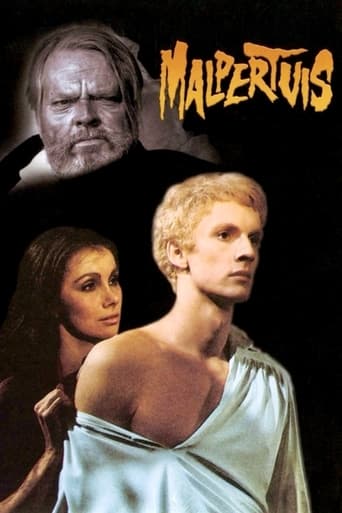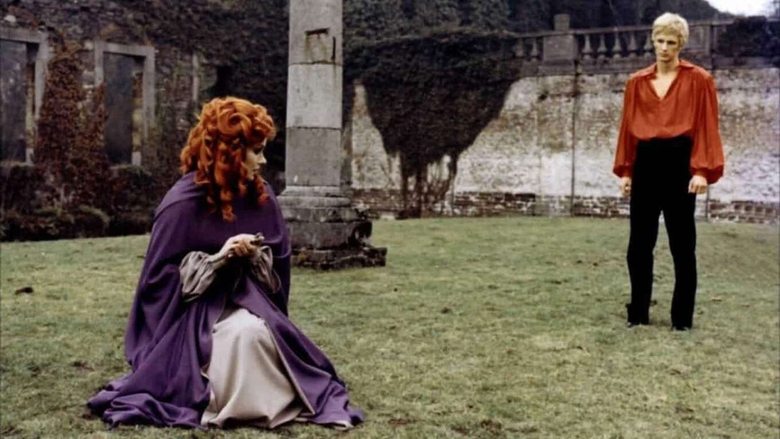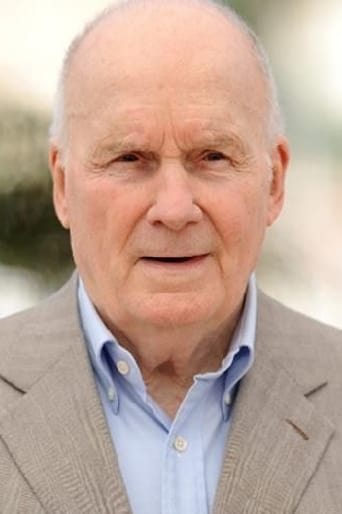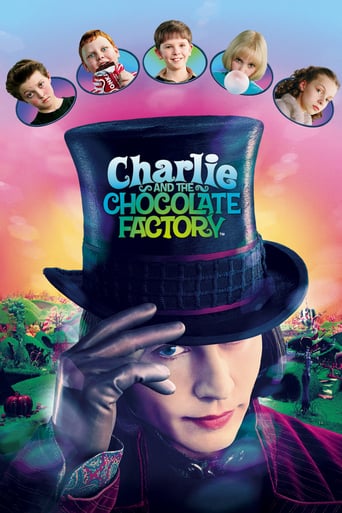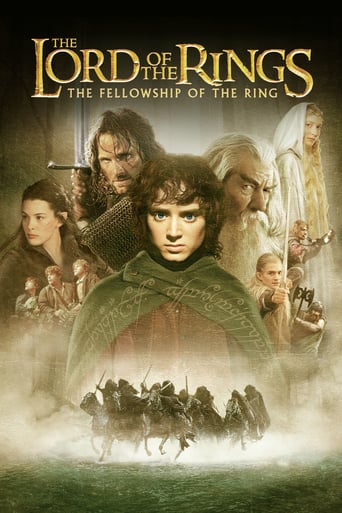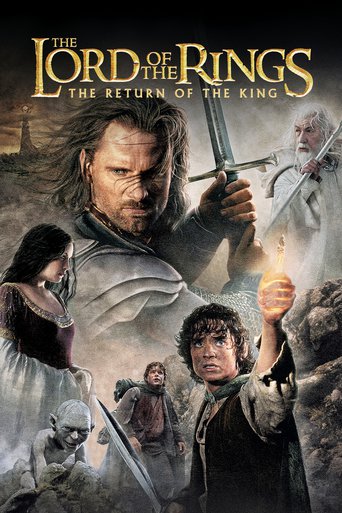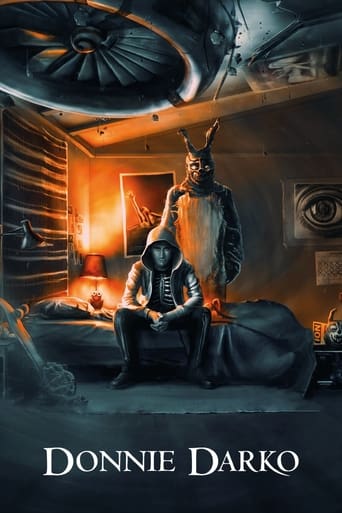Malpertuis (1971)
Malpertuis is the name of an old, rambling mansion which is in reality a labyrinth where characters from Greek mythology are imprisoned by the bedridden Cassavius. He manages to keep them, as well as his nephew and niece, prisoners even after his death, through a binding testament. As Jan, the nephew, unravels the mystery, he discovers that he cannot escape the house because Malpertuis is far more significant than he was led to believe.
Watch Trailer
Free Trial Channels
Cast


Similar titles
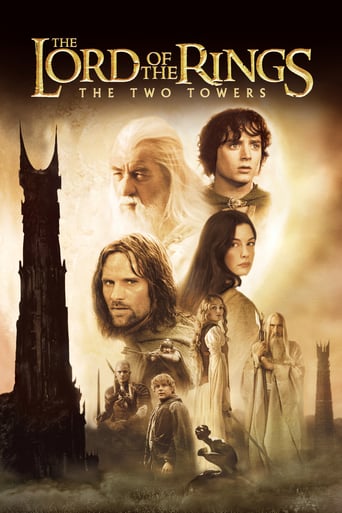
Reviews
What a waste of my time!!!
Gripping story with well-crafted characters
Awesome Movie
Excellent and certainly provocative... If nothing else, the film is a real conversation starter.
A sailor stops by his old town, realizes his family's home had been removed, attempts to find his sister, gets stuck in a bar fight over a dance hall girl, gets hit across the skull knocking him unconscious, awakening in the home of his bedridden uncle, Cassavius(Orson Welles). The sailor is Jan, portrayed by blonde headed, blue-eyed, scrawny Mathieu Carrière(Born for Hell), and he, at first, just wishes to leave but his demanding uncle has something of importance to tell him regarding a will which could prove profitable if he decides not to leave. Within the house are an eccentric group of oddballs, all attempting to appease their master, hoping to leave Malpertuis once Cassavius kicks the bucket. Even still, Jan has no desire to stay until a ravishing red head, Euryale(Susan Hampshire who plays multiple roles, presenting an astonishing range, making three specific characters completely unique and different, a multi-faceted performance that deserves praise), his cousin, arrives, throwing his life into torment. The proposition in Cassavius' will is for those inside Malpertuis to remain until one couple survives, gaining the inheritance. Relatives and hired help, the greedy vultures they are, remain, awaiting for the chance to gain the giant piggy-bank and property entitled if they can outlast their peers. Meanwhile, Jan decides to trek through the halls, mysterious rooms, and spiral staircases of Malpertuis, a massive ring containing an army of keys, hoping to unlock the secrets of the place, hoping to understand Cassavius. Along the way, Jan discovers that Malpertuis may be much, much more than just a mansion, and those people within it's walls could be more than they appear. The film incorporates dream logic which has you wondering what Jan might experience next. We are, in a sense, on the same surreal journey as Jan is, experiencing what he does, bombarded by unpredictable behavior, always yearning to learn more. Lots of symbolism, and director Harry Kümel(Daughters of Darkness)establishes the importance of faces..through the multiple characters portrayed by Hampshire(..as not only Euryale, the one Jan desires and seemingly can not touch, but also his beloved sister, Nancy, and a lusting Alice who openly engages him for sexual favors, longing to be "human", despite what she "really is"), we realize that what we are seeing isn't a real world as we know it. The mansion itself(..the astonishing spiral staircases and endless rooms/halls)is a veritable maze, about as maddening as the unusual characters which inhabits it's domain. We keep discovering, like Jan, new things regarding the characters that remain in Malpertuis, and what their true relation to him(..in a dream, faces of people that exist often derive from those you have contacted in real life). Harry Kümel's visual style is magnificent and his camera vividly captures the nuances of this remarkable habitat observing what Jan sees. Everything from the art direction(..every room produces a different kind of mood, and yields a startling color/atmosphere all it's own)to the editing(..the way Kümel is able to feature three Hampshires in one single room is awe-inspiring), everything's first-rate, developed with top-notch skill. Color me impressed because I hadn't ever heard of it's existence until just recently, and I'm thankful I had an opportunity to see it. I watched the director's cut, dubbed into French with English subtitles. Orson Welles, entirely in bed, commands the screen moving very little..it's simply amazing how much presence he had. Hampshire is positively divine, her beauty hypnotic at times. The twists at the end(..who these people are is revealed not once, but twice)really dazzle, but the pace slowly develops so many might grow impatient, but I couldn't wait to see what was gonna come next.
My hopes were high for this film. I'd seen Kumel's Le Rouge aux levres/Daughters of Darkness, the most stylish vampire/kinky sex movie ever made, and I love its sly wit and arresting visuals. Malpertuis is not as effective, alas, and I put that down to an overly-complicated story weighed down by too many classical references taken from the novel. Lampernisse, standing in for Prometheus, just doesn't work as a character. Why introduce the Erinyes, the three women who punished offenders against blood kin, when they don't advance the story? It's not an easy thing to watch a movie with a handbook of classical mythology by your side.Having said this, I will add that it is wonderful to watch film that shows a great visual sophistication (crowd shots that evoke an Ensor painting, or that wonderful twisting staircase in the house) and never needs F/X. We have lost a great deal by the subservience to CGI today.
An adaptation of a modern gothic tale "Malpertuis", written by Jean Ray aka John Flanders. The acting is good and the story is full of symbolism. There are two versions of this movie: the original (in French or in English) feels more like a horror film but the longer re-edited Dutch version lacks most of the superb atmosphere created by the haunting score of Georges Delerue and is therefore disappointing.
Based on the novel by Jean Ray (the so-called "Belgian Poe"), "Malpertuis" begins with Jan, a young sailor, being summoned with a motley company of acquaintances and family to the death bed of his mysterious Uncle Cassave. Cassave soon dies, leaving his considerable fortune to the dozen or so people he has summoned. However, there are stiff terms attached to his gift: The inheritors must all live for the rest of their lives at Malpertuis, Cassave's mansion. Jan soon realizes there is something amiss at Malpertuis (a name meaning either "house of evil" or "house of cunning"). There is something odd in the attic, in the labyrinthine hallways, and in the surrounding wood. There is something even stranger about Malpertuis' other inhabitants: the mad hermit Lampernisse who haunts the mansion's dark corridors, the coy and beautiful Euryale who will not look anyone in the face, and the diabolic taxidermist Philarete, to name only a few. When the secret of Malpertuis is finally brought to light among this bizarre cast of characters, the mansion erupts into a seething cauldron of terror, and both heaven and earth seem to collapse around Jan.While fans of Jean Ray's novel will find the story much changed, the film is visually engaging at the very least, and the casting is excellent, for the most part. Orson Welles plays the dying Uncle Cassave, delivering the second performance of his career as a large man stuck in a very large bed (the other performance being, of course, in his adaptation of Kafka's "The Trial"). Susan Hampshire gives an admirable performance in four different roles--excellently well disguised and made-over in each--as Euryale, Nancy, Alice, and a nurse. The sets are extraordinary, filling the screen with an unending stream of vivid detail. Also, the film's cinematography is often both aggressive and intelligently creative, employing just the sort of unpredictable perspective necessary to portray the mansion's mystifying interior.Disappointments with the film begin small. Jean-Pierre Cassel as Lampernisse does not look the part. Instead of a tall, shadowy, aged-but-ageless, and profoundly mad hermit, he looks like a leper who has wandered off the set of "Ben-Hur." Accompanying Lampernisse is the laughable, high-pitched babble of the "creatures in the attic." In these rare instances, the filmmakers miss by a wide margin the texture of Ray's novel. At other times the film slightly underplays or rushes some of the book's strongest scenes. The one serious offense, though, is the film's ending; the muddled chaos here is a poor substitute for Ray's synchronized anarchy.This is not to say that the film loses itself completely. The strength of the first hour and more cannot be entirely undermined by the ending. The inspired cinematography and many of the sets, performances, and special effects are truly exceptional. The scenes with little, crazed, mousy Philarete and his morbid workroom are reason enough for the film to exist. Subtlety and humor are here as well, perhaps best represented in the recurring static shot of the inheritors occupying themselves in Malpertuis' small drawing room.

